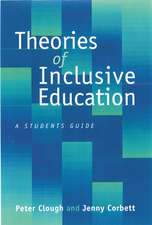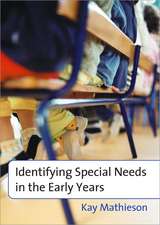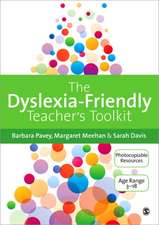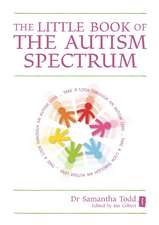63 Tactics for Teaching Diverse Learners, K-6
Autor Bob Algozzine, Pamela Campbell, Jianjun Adam Wangen Limba Engleză Paperback – 3 dec 2008
feedback from teachers on each of the tactics
indexes for finding practices relevant to a specific subject, grade, or learning difficulty
a listing by disability for locating the instructional approach best suited to individual students' special needs.
| Toate formatele și edițiile | Preț | Express |
|---|---|---|
| Paperback (1) | 283.58 lei 6-8 săpt. | |
| SAGE Publications – 3 dec 2008 | 283.58 lei 6-8 săpt. | |
| Hardback (1) | 484.49 lei 6-8 săpt. | |
| SAGE Publications – 16 dec 2008 | 484.49 lei 6-8 săpt. |
Preț: 283.58 lei
Nou
Puncte Express: 425
Preț estimativ în valută:
54.26€ • 59.13$ • 45.72£
54.26€ • 59.13$ • 45.72£
Carte tipărită la comandă
Livrare economică 23 aprilie-07 mai
Preluare comenzi: 021 569.72.76
Specificații
ISBN-13: 9781412942386
ISBN-10: 1412942381
Pagini: 160
Dimensiuni: 216 x 279 x 13 mm
Greutate: 0.43 kg
Ediția:1
Editura: SAGE Publications
Colecția Corwin
Locul publicării:Thousand Oaks, United States
ISBN-10: 1412942381
Pagini: 160
Dimensiuni: 216 x 279 x 13 mm
Greutate: 0.43 kg
Ediția:1
Editura: SAGE Publications
Colecția Corwin
Locul publicării:Thousand Oaks, United States
Recenzii
“I love the way the book addresses specific behaviors and classroom situations. The format is consistent throughout the text, which makes it easy to find information on a specific topic, skill, or content area.”
"Provides research-based strategies that educators can immediately put into practice to meet their students' unique learning needs. The authors have given us an invaluable tool for success in today's increasingly diverse classrooms and changing educational contexts."
"An in-depth, effectively organized resource guide for teachers at all grade levels, putting meaningful, practical strategies and activities just a page-turn away. Filled with the voices of teachers and students, this book won’t have time to gather dust on the shelves of teachers concerned with student success in inclusive classrooms and in today’s educational climate."
"When teachers are reaching for solutions, they should reach for this book. Positive and proactive tactics to deal with students' problematic behaviors are provided, and the range of instructional tactics enables teachers to be more responsive to students' learning needs."
"Provides research-based strategies that educators can immediately put into practice to meet their students' unique learning needs. The authors have given us an invaluable tool for success in today's increasingly diverse classrooms and changing educational contexts."
"An in-depth, effectively organized resource guide for teachers at all grade levels, putting meaningful, practical strategies and activities just a page-turn away. Filled with the voices of teachers and students, this book won’t have time to gather dust on the shelves of teachers concerned with student success in inclusive classrooms and in today’s educational climate."
"When teachers are reaching for solutions, they should reach for this book. Positive and proactive tactics to deal with students' problematic behaviors are provided, and the range of instructional tactics enables teachers to be more responsive to students' learning needs."
Cuprins
Preface
Acknowledgements
About the Authors
Part 1: Planning Instruction
1: Decide What to Teach
Assess to Identify Gaps in Performance
Establish Logical Sequences of Instruction
Consider Contextual Variable
2: Decide How to Teach
Set Instructional Goals
Establish Performance Standards
Choose Instructional Methods and Materials
Establish Groups Structures
Pace Instruction Appropriately
Monitor Performance and RePlan Instruction
3: Communicate Realistic Expectations
Teach Goals, Objective, and Standards
Teach Students to be Active, Involved Learners
Teach Students Consequences of Performance
Part II: Managing Instruction
4: Prepare for Instruction
Set Classroom Rules
Communicate and Teach Classroom Rules
Communicate Consequences of Behavior
Handle Disruptions Efficiently
Teach Students to Manage their own Behavior
5: Use Time Productively
Establish Routines and Procedures
Organize Physical Space
Allocate Sufficient Time to Academic Activities
6: Establish Positive Classroom Environment
Make the Classroom a Pleasant, Friendly Place
Accept Individual Differences
Establish Supportive, Cooperative Learning Environments
Create a Nonthreatening Learning Environment
Part III: Delivering Instruction
7:Present Information
Presenting Content
Motivating Students
Teaching Thinking Skills
Providing Relevant Practice
8: Monitor Presentations
Providing Feedback
Keeping Students Actively Involved
Ch. 9:Adjust Presentations
Adapt Lessons to Meet Student Needs
Provide Varied Instructional Options
Alter Pace
Part IV: Evaluating Instruction
10:Monitor Student Understanding
Check Understanding of Directions
Check Procedural Understanding
Monitor Student Success Rate
11:Monitor Engaged Time
Check Student Participation
Teach Students to Monitor their own Participation
Ch. 12:Keep Records of Student Progress
Teach Students to Chart their own Progress
Regularly Inform Students of Performance
Maintain Records of Student Performance
13:Use Data to Make Decisions
Use Data to Decide if More Services are Warranted
Use Student Progress to Make Teaching Decisions
Use Student Progress to Decide When to Discontinue Service
References
Additional Readings
Index
Acknowledgements
About the Authors
Part 1: Planning Instruction
1: Decide What to Teach
Assess to Identify Gaps in Performance
Establish Logical Sequences of Instruction
Consider Contextual Variable
2: Decide How to Teach
Set Instructional Goals
Establish Performance Standards
Choose Instructional Methods and Materials
Establish Groups Structures
Pace Instruction Appropriately
Monitor Performance and RePlan Instruction
3: Communicate Realistic Expectations
Teach Goals, Objective, and Standards
Teach Students to be Active, Involved Learners
Teach Students Consequences of Performance
Part II: Managing Instruction
4: Prepare for Instruction
Set Classroom Rules
Communicate and Teach Classroom Rules
Communicate Consequences of Behavior
Handle Disruptions Efficiently
Teach Students to Manage their own Behavior
5: Use Time Productively
Establish Routines and Procedures
Organize Physical Space
Allocate Sufficient Time to Academic Activities
6: Establish Positive Classroom Environment
Make the Classroom a Pleasant, Friendly Place
Accept Individual Differences
Establish Supportive, Cooperative Learning Environments
Create a Nonthreatening Learning Environment
Part III: Delivering Instruction
7:Present Information
Presenting Content
Motivating Students
Teaching Thinking Skills
Providing Relevant Practice
8: Monitor Presentations
Providing Feedback
Keeping Students Actively Involved
Ch. 9:Adjust Presentations
Adapt Lessons to Meet Student Needs
Provide Varied Instructional Options
Alter Pace
Part IV: Evaluating Instruction
10:Monitor Student Understanding
Check Understanding of Directions
Check Procedural Understanding
Monitor Student Success Rate
11:Monitor Engaged Time
Check Student Participation
Teach Students to Monitor their own Participation
Ch. 12:Keep Records of Student Progress
Teach Students to Chart their own Progress
Regularly Inform Students of Performance
Maintain Records of Student Performance
13:Use Data to Make Decisions
Use Data to Decide if More Services are Warranted
Use Student Progress to Make Teaching Decisions
Use Student Progress to Decide When to Discontinue Service
References
Additional Readings
Index
Notă biografică
Bob Algozzine is a professor in the Department of Educational Leadership at the University of North Carolina and project codirector of the U.S. Department of Education-supported Behavior and Reading Improvement Center. With 25 years of research experience and extensive firsthand knowledge of teaching students classified as seriously emotionally disturbed, Algozzine is a uniquely qualified staff developer, conference speaker, and teacher of behavior management and effective teaching courses. He is active in special education practice as a partner and collaborator with professionals in the Charlotte-Mecklenburg schools in North Carolina and as an editor of several journals focused on special education. Algozzine has written more than 250 manuscripts on special education topics, including many books and textbooks on how to manage emotional and social behavior problems.
Descriere
With a practical, research-based model, this resource offers proven instructional methods that can be used across content areas and grade levels for students with or without disabilities.











